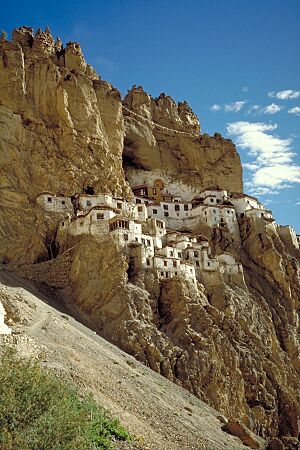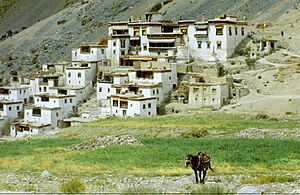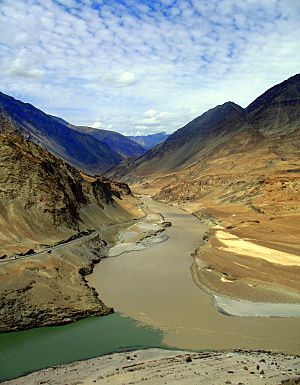Zanskar facts for kids
Zanskar (Urdu: تحصیل زنسکار) is a special sub-district located in the Kargil District of Jammu and Kashmir, India. It's a remote area known for its beautiful mountains, deep valleys, and unique culture. Zanskar is a high-altitude region, meaning it's very high up in the mountains, making it a challenging but amazing place to visit.
What is Zanskar Like?
Zanskar is famous for its stunning natural beauty. It's surrounded by the mighty Himalayas, with towering peaks and deep gorges carved by rivers.
Mountains and Rivers
The landscape of Zanskar is mostly rugged mountains and narrow valleys. The main river flowing through the region is the Zanskar River. This river is a tributary of the Indus River, and it carves a dramatic path through the mountains. In winter, parts of the river freeze, creating a famous "Chadar Trek" for adventurers.
High-Altitude Climate
Because Zanskar is so high up, it has a very cold and dry climate. Winters are long and harsh, with heavy snowfall that often cuts off the region from the rest of the world. Summers are short and mild, which is when most visitors come.
Who Lives in Zanskar?
The people of Zanskar are mostly of Tibetan origin and follow Tibetan Buddhism. They have a rich culture and a strong connection to their traditions.
Culture and Traditions
Life in Zanskar is deeply connected to Buddhist practices. You'll find many ancient monasteries, called "gompas," built into the mountainsides. These monasteries are important centers for learning and religious life. The people are known for their warm hospitality and simple way of life.
Language and Lifestyle
The main language spoken in Zanskar is Zanskari, which is a dialect of Ladakhi. Most people live in small villages, often farming barley and peas in the short summer months. They also raise animals like yaks, which are very important for their milk, wool, and as pack animals.
Getting to Zanskar
Reaching Zanskar can be quite an adventure! Due to its remote location and high passes, it's only accessible for a few months each year.
Roads and Passes
The main way to get to Zanskar is by road, but these roads are often challenging. They cross high mountain passes like the Shingo La and the Pensi La, which are covered in snow for much of the year. When the passes open, usually from July to September, vehicles can travel to the region.
Winter Challenges
In winter, the roads close, and Zanskar becomes isolated. During this time, the frozen Zanskar River becomes a unique pathway, known as the Chadar Trek, for locals and brave trekkers to travel on foot.
Important Places in Zanskar
Zanskar is home to several significant monasteries and natural landmarks.
Phugtal Monastery
One of the most famous places is the Phugtal Monastery. It's an incredible monastery built into the side of a cliff, almost like a honeycomb. It's very old and can only be reached by foot, making it a truly special place.
Lingshed Monastery
Another important monastery is Lingshed Monastery. Like Phugtal, it's located in a remote area and offers amazing views of the surrounding mountains. These monasteries are not just religious sites; they are also centers of community life.
Zanskar River Confluence
The point where the Zanskar River meets the mighty Indus River is a spectacular sight. The two rivers, often different in color, merge to continue their journey through the Himalayas.
Images for kids
-
Row of Chorten (or Stupa) at the village of Purne. Each of the elements that constitute these edifices, as well as their color, has a symbolic meaning in Tibetan Buddhism.
See also
 In Spanish: Zanskar para niños
In Spanish: Zanskar para niños
 | John T. Biggers |
 | Thomas Blackshear |
 | Mark Bradford |
 | Beverly Buchanan |









